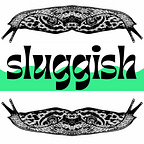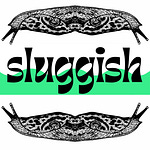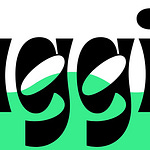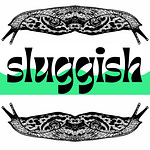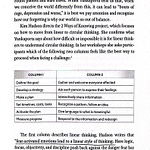How do neurodivergent creatives function when we can’t executive function? What do we really mean when we say we want to be productive? And what does climate change have to do with our creative process?
In this episode I talk to co-founder of Writer’s HQ and award-winning environmental journalist Sarah Lewis about the climate stories we tell and our struggles in telling them. Plus, Sarah explains what she thinks is missing from climate fiction these days, the limited kinds of apocalypse stories we hear, and what kind of stories we might want to try telling instead. At the end she also shares a juicy list of reading recommendations!
Subscribe to follow her work at fictionalsarah.substack.com, or find her on basically any platform as fictionalsarah.
For a transcript, check the tab on the web version of this post (but pls blame all typos on Substack’s AI, which created it)
Links:
The inspo for this chat: Inner Worlds vs. Outer Worlds [Fictional Sarah]
We Need A New Word For Climate Change [Fictional Sarah]
When the Hero is the Problem by Rebecca Solnit
Joseph Campbell and the Myth of the Monomyth video essay by Maggie Mae Fish
Thrust by Lidia Yuknavitch
The Gondoliers by Karen Russell (read as a campfire story by The Woburn Public Library!)
If you don’t have time to listen right now — here’s a few selected quotes lightly edited for your reading pleasure.
On ideating, structuring, and intuiting a piece of writing:
SARAH: It kind of feels like growing a plant, because it's like, all right, I've got this seed of an idea and I'm just kind of like nourishing it, and it's just kind of getting bigger and bigger. And, yeah, it is just this constant going back to those kind of first principles of like, Oh, what is this thing I’m trying to say?
JESS: And then it gets to the point where you have to put it on a trellis. I think that's the hard part for me where I'm like, now I have to put it on the trellis and I have to build the trellis, and like, ugh, I hate that.
SARAH: Yeah, but do you find that sometimes it just sort of happens on its own?
It's a bit like you're pushing a boulder uphill — hang on, I'm changing the metaphor now, sorry — you're pushing a boulder up the hill and you keep going, keep going, keep going, and then at some point, you just sort of tip over the edge and you can't really stop it and it's like...I'll sit down and look at my notes and think, oh man, I've got loads to do on this. And then when I actually look at it, I go, oh no, I just need to actually sort these paragraphs round, and all of a sudden it's just there.
But I think that's the whole thing about what your process is and what you're actually doing, whether you're focusing solely on the end goal or whether you're focusing on the practice itself, and I think that can get really complicated for people who are writing for a living, because you have to have an end goal, otherwise, you don't pay the bills.
But at the same time, you have to maintain the joy of the process. And I think for me, when I'm really in it, And when I'm really enjoying, you know, the reading and the thinking, and trying to come up with smart-ass things to say, and trying to write good jokes…I get so into that, I kind of don't quite realize that I've made it to the end. It's like a pleasant surprise.
On the contradictions of executive function:
SARAH: This is a political category, and this is about who gets to be full human and who doesn't, but also, I need this label to access the things I need and also to give me a language to explore my experience of the world. And I think my personal experience is that I spent years sitting around going, Oh, why can't I do this thing? Or, why am I just sitting here? Or like, you know, task switching is a particular thing that I just really struggle with. You know, so I'd be like, I've just done a thing, why can’t I now do another thing?
And it wasn't until I discovered the language of executive functioning that I went, Oh right, okay, so the problem I have is specifically this, so now I can use that language to find ways of making this stuff easier or different. And yeah, like you say, it is then an avenue into a more political conversation.
Certainly at Writers HQ, so much of what we were doing was around supporting writers to write more and to create, often using the language of executive function. But so many people would come to me and say, well, I want to be more productive. And the first thing I would say is why? And what do you mean by that?
And actually, almost invariably, what they mean is, I want to live a more connected and creative life. Which is different, a very different thing to being productive. So, it's a kind of duality, isn't it? Between, okay, well, this is a really useful language for explaining these problems, versus this is some kind of weaponized LinkedIn kind of stick to beat yourself with and make you do more shit. Because you want to do things, and when you have problems with executive functioning, you can't do stuff, and that stuff might be activism or political..
JESS: Well, and you have to do stuff, you know, you have to work, and that whole world of work is set up in an executive functioning style. So yeah, it's not really something most people can opt out of, so you kind of have to figure out how to, I don't know like, fake your way through it or [find] work-arounds for it.
I think the word “executive” also is really interesting, because people don't usually make the connection that like, that's how our government and corporations are set up also. You were saying about how science is determined by capitalists who fund it, and also the ideas that come out of science, I think, are determined by the culture that the science is being done in. So, yeah, I think of it as like, a CEO-method of functioning.
On re-thinking our relationship to nature and writing from the body:
SARAH: I just think there's a lot of ways we can do this better, and there's a lot more interesting ways of existing that doesn't boil down to this idea of one hero, you know, or we all have to be heroes. There's a brilliant Rebecca Solnit essay called, When the Hero is the Problem, and it's about this problem of the figurehead, which is essentially what all our stories are about. I really want to see more of that kind of polyphonic voice, and stories where we really reimagine what nature is and what our relationship to nature is, and how we exist within it, you know.
It's not the backdrop to the story…you don't go out into the forest and find yourself and then come back into the city. It doesn't exist as a foil for the hero to do his story, it is the story, you know.
I think there's so much interesting stuff to talk about in how we sort of place ourselves in this hierarchy of like, well, don't worry about the soil, that's just dirt, you know. And one thing I'm slightly obsessed with at the moment is stories that come out of somatic writing… it's kind of using the experience of the body to access a deeper human truth, basically, rather than just sitting in our brains going, oh, I’m going to write something very clever.
This just all comes back to this idea of, you know, a broader connection, and I'm just really fascinated as to what those stories are.
JESS: I wonder if you think — my brain just connected back to the beginning of our conversation — but I wonder if you think that somatic writing is kind of like, anti-executive function? Because if you're writing from the body — I don't know, I've literally never heard of it, so maybe I'm wrong about what it is — but if you're writing from the body and not from your head, then, yeah, it sounds to me kind of the opposite of an executive function.
SARAH: Yeah, very much so. I hadn't even thought of that, but I think you're exactly right. And I think it's, in a way it's that kind of gestalt therapeutic method, isn't it? Of like, okay, how are you feeling right now? Where in your body is it?

